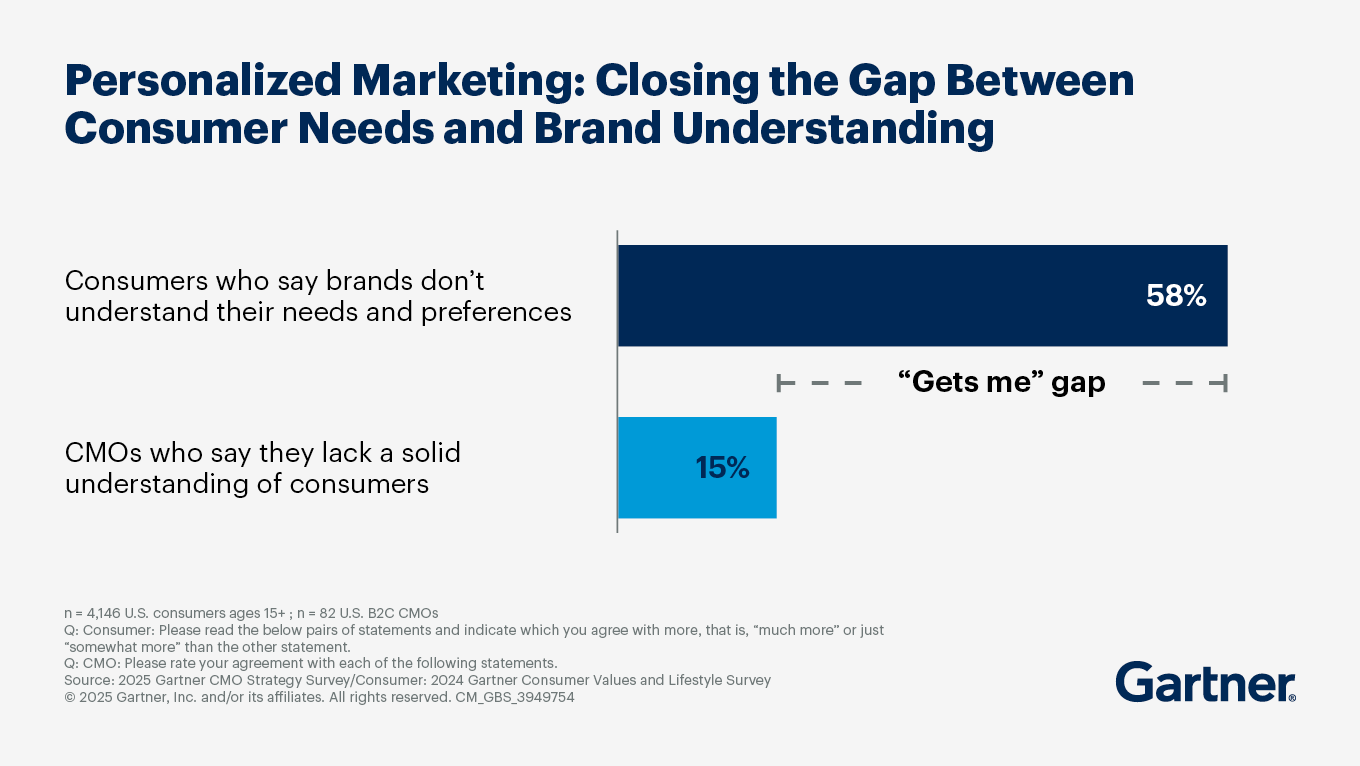Build a personalized marketing strategy that connects with the right people at the right time
- Gartner client? Log in for personalized search results.
Nearly half of personalized marketing communications are perceived as irrelevant or intrusive.
To succeed, CMOs must uncover why personalization isn’t connecting with every audience, pinpoint the right moments in the customer journey to personalize, and choose tactics that drive future marketing success.
Download key statistics and insights on customer understanding and personalized marketing, including:
- Customer understanding gap that limits marketing personalization
- How customers perceive personalized digital communications
- Findings from the 2025 Gartner Marketing Personalization Survey
Webinar: How CMOs Can Revitalize Personalization for Future Growth
Discover actionable strategies to overcome common obstacles that delay purchase decisions and unlock the full potential of marketing personalization.
About Personalized Marketing
Personalized marketing is a cornerstone of modern marketing strategy, empowering brands to deliver relevant, tailored experiences at every stage of the customer journey. For CMOs and marketing leaders, its importance extends beyond simply addressing customers by name or segmenting audiences. It’s about creating truly meaningful interactions that reflect a deep understanding of individual preferences and behaviors, all rooted in customer centricity.
In today’s digital world, scaling personalized marketing content is one of the most critical roles for marketing teams. However, the path to effective personalization is nuanced. Marketers must balance the desire to deliver highly tailored messages with the need to respect customer boundaries. Too much personalization can feel invasive, while too little can render communications irrelevant. According to Gartner, 48% of personalized communications fail to hit the mark and are perceived by customers as either irrelevant or intrusive. The challenge for marketing leaders is to find the right equilibrium, ensuring that every touchpoint adds value and strengthens the brand-customer relationship.
Personalized marketing’s intent is to provide the right message to the right person at the right time, driving both conversion and customer satisfaction. Achieving this requires more than just advanced technology or data collection. It demands a clear strategy aligned to business objectives, a realistic assessment of opportunities, and a commitment to continual improvement. Customer centricity must be at the heart of these efforts, guiding marketing leaders to prioritize tactics based on their impact, feasibility, and alignment with customer perceptions. This ensures that personalization efforts are both effective and sustainable.
For B2B brands, personalization is equally vital. Buyers expect tailored communications and experiences, especially when they have chosen to share their data. However, over-personalization or a lack of permission can quickly lead to negative reactions, including being blocked or ignored. Successful marketing leaders recognize the need to adapt strategies to industry nuances, generational preferences, and the specific expectations of their audience.
Ultimately, personalized marketing is about building trust and delivering value. When executed thoughtfully and with customer centricity as a guiding principle, it allows brands to stand out in a crowded marketplace, foster lasting loyalty, and demonstrate the true value of marketing as a driver of business growth. For CMOs, mastering personalized marketing is not just a competitive advantage; it’s a necessity for long-term success.
Personalized Marketing FAQs
What is meant by personalized marketing?
Marketing personalization is the delivery of the right message to the right audience and in the right context (that is, tone, timing and channel) to maximize marketing and advertising performance.
How to do personalized marketing?
To do personalized marketing, you can begin with collecting and analyze customer data to deliver tailored content and experiences through channels like websites, emails, and ads, ensuring each interaction is relevant to individual preferences and behaviors.
What are the benefits of personalized marketing?
The greatest benefit for consumers is receiving helpful, relevant support that makes their decision-making easier. In today’s world, where people are short on time and overwhelmed by choices, personalized marketing provides clarity and confidence, guiding them through the purchase process and helping them complete it.

